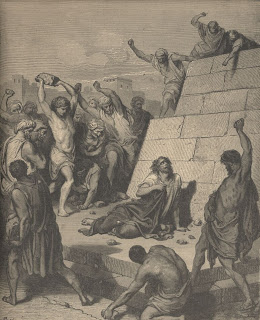St. Stephen's Day
All that we know about Stephen the Protomartyr (that is, the first martyr of the Christian Church) is found in chapters 6 and 7 of the Book of Acts.
The early Christian congregations, like the Jewish synagogues, had a program of assistance for needy widows, and some of the Greek-speaking Jews in the Jerusalem congregation complained that their widows were being neglected. The apostles replied: "We cannot both preach and administer financial matters. Choose seven men from among yourselves, respected, Spirit-filled, and of sound judgement, and let them be in charge of the accounts, and we will devote ourselves to prayer and the ministry of the word." The people accordingly chose seven men, including Stephen, and the apostles laid their hands on them. They are traditionally considered to be the first deacons, although the Scriptures do not use the word to describe them. (The Scriptures do refer to officials called deacons in the local congregations, without being very specific about their duties; and a century or more later, we find the organized charities of each local congregation in the hands of its deacons.)
Stephen was an eloquent and fiery speaker, and a provocative one. (Some readers have speculated that some of his fellow Christians wanted to put him in charge of alms in the hope that he would administer more and talk less.) His blunt declarations that the Temple service was no longer the means by which penitent sinners should seek reconciliation with God enraged the Temple leaders, who caused him to be stoned to death. As he died, he said, "Lord, do not hold this sin against them." One of those who saw the stoning and approved of it was Saul (or Paul) of Tarsus, who took an active part in the general persecution of Christians that followed the death of Stephen, but who was later led to become a Christian himself.
We remember Stephen on December 26, the day after Christmas. Hence the song
Good King Wenceslas looked out
On the feast of Stephen,
describes an action of the king on the day after Christmas Day. The tune used with this song is older than the words and was previously used with a hymn often sung on the feasts of Stephen and other martyrs. It begins:
Christian friends, your voices raise.Wake the day with gladness.
God himself to joy and praise
turns our human sadness:
Joy that martyrs won their crown,
opened heaven's bright portal,
when they laid the mortal down
for the life immortal
We give thee thanks, O Lord of glory, for the example of the first martyr Stephen, who looked up to heaven and prayed for his persecutors to thy Son Jesus Christ, who standeth at thy right hand: where he liveth and reigneth with thee and the Holy Spirit, one God, in glory everlasting.
Acts 6:8-7:2,51-60
8 Stephen, full of grace and power, did great wonders and signs among the people. 9Then some of those who belonged to the synagogue of the Freedmen (as it was called), Cyrenians, Alexandrians, and others of those from Cilicia and Asia, stood up and argued with Stephen. 10But they could not withstand the wisdom and the Spirit with which he spoke. 11Then they secretly instigated some men to say, ‘We have heard him speak blasphemous words against Moses and God.’ 12They stirred up the people as well as the elders and the scribes; then they suddenly confronted him, seized him, and brought him before the council. 13They set up false witnesses who said, ‘This man never stops saying things against this holy place and the law; 14for we have heard him say that this Jesus of Nazareth will destroy this place and will change the customs that Moses handed on to us.’ 15And all who sat in the council looked intently at him, and they saw that his face was like the face of an angel.
7Then the high priest asked him, ‘Are these things so?’ 2And Stephen replied:
‘Brothers and fathers, listen to me. The God of glory appeared to our ancestor Abraham when he was in Mesopotamia, before he lived in Haran,
51 ‘You stiff-necked people, uncircumcised in heart and ears, you are for ever opposing the Holy Spirit, just as your ancestors used to do. 52Which of the prophets did your ancestors not persecute? They killed those who foretold the coming of the Righteous One, and now you have become his betrayers and murderers. 53You are the ones that received the law as ordained by angels, and yet you have not kept it.’
54 When they heard these things, they became enraged and ground their teeth at Stephen. 55But filled with the Holy Spirit, he gazed into heaven and saw the glory of God and Jesus standing at the right hand of God. 56‘Look,’ he said, ‘I see the heavens opened and the Son of Man standing at the right hand of God!’ 57But they covered their ears, and with a loud shout all rushed together against him. 58Then they dragged him out of the city and began to stone him; and the witnesses laid their coats at the feet of a young man named Saul. 59While they were stoning Stephen, he prayed, ‘Lord Jesus, receive my spirit.’ 60Then he knelt down and cried out in a loud voice, ‘Lord, do not hold this sin against them.’ When he had said this, he died.



Comments
I never knew about the Feast of Stephen. That's so cool.
Thanks for your lovely blog.
And thanks for the nice comment left in mine.
I love your post on St. John, too.